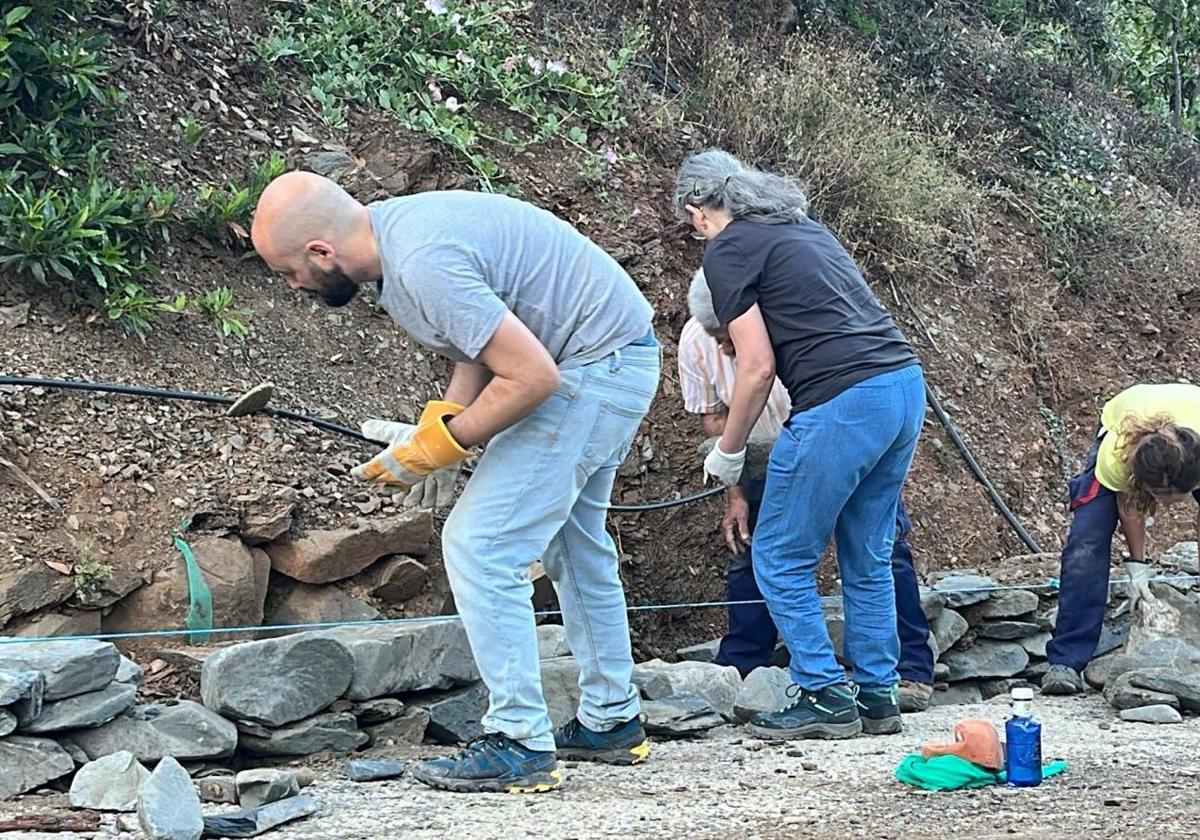Malaga's travelling school of rural crafts: from dry stone walling to traditional breadmaking
This initiative seeks to prevent the loss of some fundamental skills that were essential to rural life until a few decades ago, including crafting useful items from esparto grass and willow
Build a balate , a dry-stone wall, to combat erosion on sloping ground and gain land that can be used to grow food. Or make handicrafts from cork, esparto grass or other fibrous plants. These are some of the skills that some 50 students will acquire due to a project in Malaga province. They form the first intake of a 'school' with a difference, one that aims to prevent the loss of old trades that were quite common - and still needed - until just a few decades ago.
Who better to teach these subjects than the experienced residents of several inland villages of Malaga province? From April to September this year these unique experts on rural life will provide a rather unique knowledge transfer to younger learners aspiring to repopulate the inland, more rural areas of Malaga.
For one thing, this project will ensure that several trades and traditions can keep going because, without many of them, the primary sector (agriculture and livestock husbandry) cannot be fully understood.
This initiative, dubbed the 'travelling school of rural skills', includes nine trades that are being taught in three areas around Malaga province: Axarquía, Serranía de Ronda and Sierra de las Nieves. The 50 or so participants receive practical and theoretical classes in villages such as Benalauría, El Borge and El Burgo.
The association Cicerones Rurales is running and supporting this project with funding from the tertiary sector aid programme provided by Malaga's provincial council (Diputación). Last year the association identified the need to pass on this knowledge so that these skills and trades are not lost, and it also saw this as an opportunity to enable the younger generations to find a professional footing, a viable trade or business opening in rural Malaga, inland from the Costa del Sol.
The origin of this idea came from the association's event called 'Muestra Intergeneracional Saberes Rurales', a kind of knowledge exchange between different people, young and old. The former taught the latter about new technologies, for example, how to make a doctor's appointment via a mobile phone to how to do online banking. Still, the real surprise came when the older people started demonstrating to the youngsters how certain tasks were done in the past. "We saw a simplicity, a chance to mould something from this encounter, which then led us to come up with this initiative, because we saw that the young people wanted to know more," explained Toñi Gallego, president of Cicerones Rurales.
Among the students are some young people who want to learn how to manage their vegetable gardens and vineyards in the Axarquía, plus a group of unaccompanied refugee minors from Cortes de la Frontera who are learning how to make traditional bread in the Axarquía. This last group is the most vulnerable to social exclusion, as many of them are close to coming of age with few opportunities to move forward. According to Gallego, once this course is completed, some of them could end up being employed by the Hermanos Guerrero bakery in Benalauría, where they are currently learning directly from the owners.
The nine trades to be taught under this initiative vary by location. In the Axarquía the students can learn about the end-to-end processing of raisins, dry stone wall construction or the different uses of lime. It is traditional bakery skills or the making of kitchen utensils by crafting with wood and cork in the Serranía de Ronda. Finally, in the Sierra de las Nieves, they are teaching traditional handicrafts using esparto grass and other fibrous plants or ceramics, or beekeeping.
To help with rolling out these courses, Cicerones Rurales has three area coordinators, who were previous trainees within this association, namely Ezequiel Moya (Axarquía), Pepe Verdugo (Serranía de Ronda) and Noemí González (Sierra de las Nieves). In addition to these three, the involvement of the masters of these trades themselves is fundamental to project success, as is the collaboration of public and private entities in these areas.
Among the collaborators are the Paolo Freire rural university, Benalauguía, the Hermanos Guerrero bakery, José Gómez 'Arte en Madera', Sonrisas de Corcho, the Sierra de las Nieves' business association, Miel Istán, Rafael y Paca (esparto crafts), the pottery workshop of El Burgo, the CIV Moscatel de la Axarquía, Arco Gestiones, Asociación El Pasero and the local councils for Benalauría, Alpandeire, El Borge, Almáchar and Casarabonela.



Comentar es una ventaja exclusiva para registrados
¿Ya eres registrado?
Inicia sesiónNecesitas ser suscriptor para poder votar.